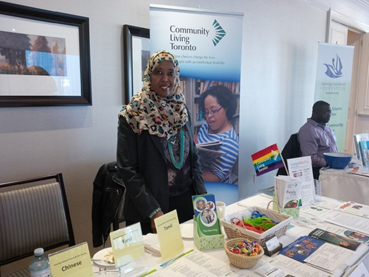By: Ilaneet Goren, Diversity Specialist
Immigrants and refugees with disabilities are an integral part of our diverse communities. Yet their needs, challenges and lived realities are not well understood or incorporated in service design and delivery, according to reports. Community Living Toronto and OCASI (Ontario Coalition of Agencies Service Immigrants) have been working together to address this gap through awareness-raising and knowledge sharing initiatives.
Thanks to this ongoing collaboration, settlement workers have been learning about intellectual disability, developmental services in Toronto and Ontario, ConnectABILITY.ca, and how to connect newcomer families to the right supports. Likewise, service providers in the developmental sector have gained a greater understanding of the unique challenges relating to migration and settlement and how these experiences affect newcomers’ ability to access services.
In early November, my Bridging Diversity colleagues Bob Ferguson and Layla Ibrahim and I participated in a two-day conference geared toward settlement sector professionals in Ontario. We partnered with Chavon Niles, OCASI’s Accessibility Coordinator to deliver a workshop on supporting immigrant and refugee families and children with disabilities. We also had a display table with information on how to access Adult Developmental Services and Early Childhood and Family Resources in Chinese, Farsi and Tamil.
Most conference participants who visited our table were interested to learn about the services available so that they can make better referrals for their clients, many of whom find the system difficult to navigate. Some service providers have asked us to deliver information sessions at their agency, an invitation we’re happy to accept because these conversations help dispel misconceptions around intellectual disability in some communities which prevent many families from reaching out for support.
Earlier this year, OCASI and Community Living Toronto co-hosted a series of cross-sector roundtable discussions in Toronto, Ottawa and London. The conversations explored the barriers immigrants with physical and intellectual disabilities face when trying to access community support services. One of the key recommendations was to work better across our professional ‘silos’ in order to create more opportunities for cross-sector cooperation and allow agencies to share experiences and resources while strategizing for systemic change.
Developing effective partnerships has been the cornerstone of our diversity and inclusion work at Community Living Toronto. As more refugees — many with children – will be arriving in Canada, we will continue to draw on the strengths of our partnerships to help meet their needs.
![Community Living Toronto [logo]](https://cltoronto.ca/wp-content/themes/communitylivingtoronto2/img/clt-logo.jpg)
